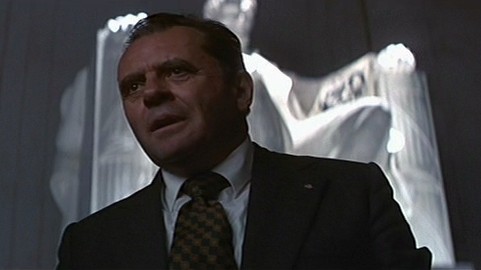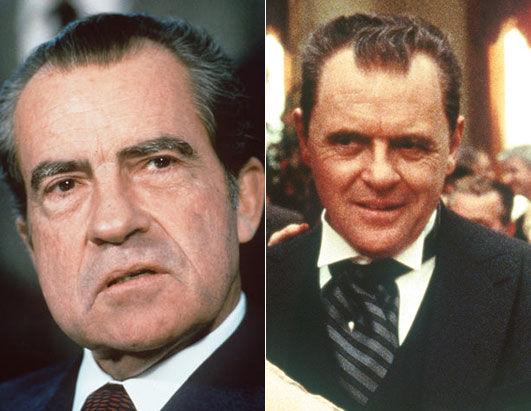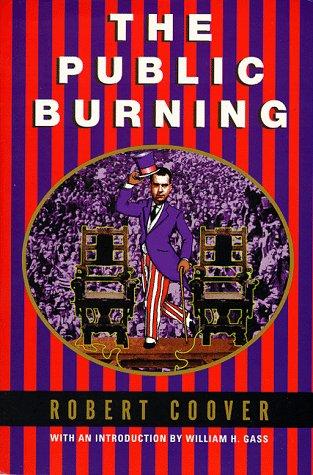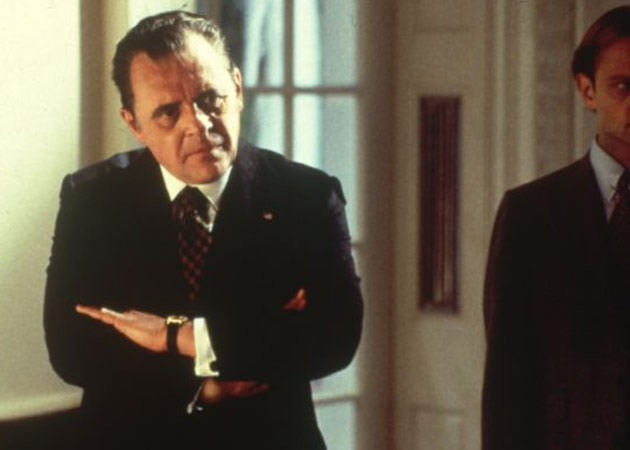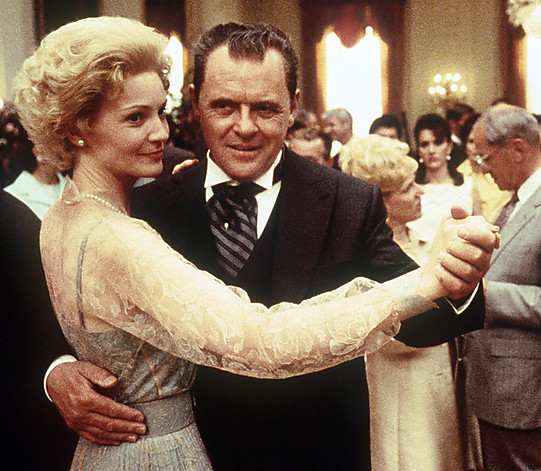From the Chicago Reader (December 22, 1995). — J.R.
Nixon
* (Has redeeming facet)
Directed by Oliver Stone
Written by Stephen J. Rivele,
Christopher Wilkinson, and Stone
With Anthony Hopkins, Joan Allen, James Woods, J.T. Walsh, Paul Sorvino, Powers Boothe, David Hyde Pierce, E.G. Marshall, Madeleine Kahn, David Paymer, and Mary Steenburgen.
Did we really win the cold war? I know that capitalism prevailed on the economic front, but I’m less sure about the cultural front. I suspect a capitalist version of Stalinist culture has triumphed rather than any sort of democracy: Stalinist culture meaning calcified, state-supported art built around solemn, hulking father figures — something like Oliver Stone’s latest two-ton Christmas turkey, Nixon. If we recognize that Disney has effectively become the federal government, the rest of the scenario falls into place. Just as Stalin’s flunkies had to praise the official “masterpieces” of Stalinist art no matter how inert or uninventive they were, Nixon‘s producers (who’ve spent millions promoting the movie) have guaranteed that media savants are already describing Stone’s Nixon as a figure of Shakespearean proportions rather than the poorly cast, two-dimensional numskull decked out with a few grade-Z horror-movie traits that he is.
Toddlers have been treated a lot more like adults by the movies this year than grown-ups have. Toddlers who wanted to see eyes ripped out of a head, for instance, had no difficulty viewing the G-rated Toy Story; apparently the ratings board figured that the head belonged to a toy, and any toddler could tell the difference between a toy and a person even if the toy characters here were more believable than the human ones. Adults who wanted to see an eye squeezed out of a head in Casino, however, were not so fortunate; apparently the ratings board figured that grown-ups couldn’t be trusted to tell the difference between real and make-believe violence and insisted on giving the film an NC-17 unless cuts were made.
Another advantage to being a toddler in 1995 and seeing movies like Babe, Pocahontas, Toy Story, and Arabian Knight is that you didn’t have to sit through juvenile tributes to flawed, all-powerful daddy figures (read “leaders”). Even if such patriarchal standbys were around occasionally in these and other kids’ movies, they were generally regarded as passing icons or figures of fun, not as towering, visionary role models for teenage boys, whereas Oliver Stone in such grown-up fare as Platoon and Wall Street and JFK and Nixon pathetically fixates and depends upon such dubious figureheads. It’s a characteristic his films share with their power-worshiping models (from Citizen Kane to Patton) and counterparts (from Schindler’s List to most Stalinist epics). And, as a corollary, it appears that only big-time directors and leaders belong in the Shakespearean category; viewers and other victims of their whims don’t qualify.
Isn’t it only a matter of time before Stone or one of his successors gives us a Stalin for Christmas? Such an epic compendium of 20th-century great-man theory would explain how, sure, the man was a mass murderer and had his share of personal problems, but, hey, “he had greatness within his grasp” (the key advertising slogan for Nixon). And, poor guy, he never had all the love he needed. (It’s probably because Tricky Dick’s bossy mom was such a tough customer — even as played by Mary Steenburgen — that we invaded Cambodia; compare Born on the Fourth of July, which indirectly blames the crippled hero’s mother for his going to Vietnam.) After all, isn’t “he” (Joseph, Tricky Dicky, Charles Foster Kane, etc) just like “us” (Oliver, Steven, Orson, etc)? And isn’t Stalin therefore worthy of our awe, our pity, our compassion, and our unbounded interest — unlike his countless victims, many lying in unmarked graves, who are too boring and uncommercial for words and therefore nothing like us?
To be fair, Nixon isn’t quite as dull as most Stalinist epics (though several of them, ranging from Alexander Nevsky to The Enchanted Desna, have afforded me infinitely more pleasure). But it’s equally important to recognize that Nixon has practically nothing to say to us about the current world, unlike a genuine masterpiece like Lamerica, opening this week at the Music Box, though of course Lamerica isn’t supported by Disney’s millions. Nixon is pretentious and ugly, and its insight into human behavior can be reduced to a few hand-me-downs from other movies, so the kind of media attention and credibility it’s getting is quite simply the kind that money can buy.
Case in point: One thing we all know without even seeing Nixon is that it’s not going to ruffle the feathers of anyone who ever voted for Nixon, not in any way that matters. When Mary McCarthy argued that Nixon was being made a scapegoat for our defeat in Vietnam and that Watergate was merely a pretext, she had a point. The media made the essential facts of the Watergate burglary fully apparent to anyone who cared to notice before Nixon won his second term in a landslide. No doubt the baroque mendacity of the cover-up made him look worse, but to pretend that the American people were sincerely shocked by facts that had been staring them in the face for months is to buy into the hypocrisy that the American public wasn’t accountable for electing a crook to office. Part of Nixon‘s agenda is to allow this fiction to survive without a wrinkle, apparently because you sell more tickets if you flatter your audience. (Similarly, Americans who’ve recently chosen to spend less money on education and art and more on light entertainment — even heavy light entertainment like Stone’s — can expect to be flattered for their wisdom in movies released in 2015, which will want their money too.)
Unlike Stone’s last few pictures, Nixon is released not by Warner Brothers but by Hollywood Pictures, a Disney subsidiary. Though this probably means a step down in budget, it’s fitting in another sense, because Disney gives the film the ring of “official” state art. Last summer, when Pocahontas was released, one of its many promotional spin-offs was a massive “educational” program about American history and animation techniques for schoolchildren in shopping malls, free of charge. Three years ago, Malcolm X had its own set of “study guides” to match those of JFK — and that was only Warners. Disney is the leader in reinventing history and disseminating the resulting fantasies via theme parks and toys, clearly shouldering the burden of much of our country’s educational and artistic programs, with our blessing and our full financial support.
From this standpoint, Nixon can be considered not an interpretation of our history but what will remain of that history a few years from now, shrunk to theme-park simplicities and converted into school curriculum. No wonder the published script has footnotes; because light entertainment is today’s education, today’s art, Stone’s current task is to outline the only culture we’ve agreed is worth having. He’s the prof, the artist, and the prez all rolled into one — like Nixon, the daddy we elected and deserve. It’s horrifyingly easy to imagine, a few years hence, the shot of blood oozing from Nixon’s steak in Nixon being used in schools as an example of film metaphor, standing in mainly for the four students killed by National Guardsmen at Kent State University in 1970. The students themselves are thoughtfully kept in the wings, as are all those unphotogenic Cambodians, so that Oliver’s Shakespearean gifts can properly be placed center stage.
My insides were rent suddenly with a powerful explosion, sending me skidding on my face several feet across the floor, and there was a terrific inundation! I seemed to be leaking at all pores and orifices — I couldn’t even scream! Uncle Sam let out a fearsome groan and seemed to fall away — yet he remained inside me, throbbing and exploding. I lay there on the spare-room floor, gurgling, sweating, half-senseless, bruised and swollen and stuffed like a sausage, thinking: Well, I’ve been through the fire. After this, very few, if any, difficult situations could seem insurmountable if anything personal is involved. Nothing could match this. Nothing could top it. Not without being fatal. — Robert Coover, The Public Burning
This bit of melodramatic hyperbole comes from the penultimate page of Coover’s brilliant if hysterical 1977 comic fantasy novel about the execution of the Rosenbergs in the early 50s and American cold-war madness. Newly elected vice president Richard M. Nixon narrates a good half of the book, including this passage, in appropriately sweaty, jaw-clenching style (which he seems to have learned from his favorite jaw-clenching book, Whittaker Chambers’s Witness). The ordeal he’s describing is literally being buggered by Uncle Sam — the ultimate mythical encounter, which Nixon himself might have described as the price he had to pay for his fatal date with destiny. One can almost imagine it being filmed by Quentin Tarantino, to the accompaniment of kettle drums or loud disco, at least if Tarantino took on political subjects and shared Coover’s exclusively comic vision of Nixon.
Coover’s novel is the shrewdest artistic representation of Nixon’s essence and legacy, his flamboyantly masochistic sense of noir martyrdom, that I know. But alas, Oliver Stone’s sense of humor is no better than Nixon’s, and even though he begins Nixon with the sound of kettle drums — just as we’d expect, and without a shred of irony — the handful of intentional gags sprinkled over the next 190 minutes of huffing and puffing are usually about as graceful as Nixon’s guest appearances on Laugh-In.
Nixon‘s references to Citizen Kane (among them, leaping around in time over a power monger’s career, the camera crawling up a fence, a newsreel suddenly ending with an abrasive sound distortion) are another reason I find the movie ludicrous: they’re Stone’s way of saying “Goddamn it, I have greatness within my grasp.” And the less Stone has to say, the more he raises his voice. Even more pretentious is Stone telling Peter Biskind in Premiere that “we looked at Eisenstein movies — Ivan the Terrible and Alexander Nevsky.” Maybe he did, but he sure as hell didn’t study them for their compositions or editing: Nixon is as visually lazy and scattershot as the MTV montages in Natural Born Killers. Stone’s idea of innovative filmmaking is to recount part of Nixon’s early political career in a fake black-and-white March of Time newsreel (again, trying to remind us of Kane) in an anachronistic ‘Scope format. Of course, once this newsreel gets panned and scanned for video next year it will be reduced to something approaching the original screen ratio of The March of Time, which will improve its credibility, a process that will also compress Stone’s sprawling compositions. Nixon is perhaps a first in film history, a movie that can only be improved by the visual degradation the video marketplace requires.
A good many key moments in Nixon are Wellesian low angles of Nixon (Anthony Hopkins) in the White House standing under paintings of other presidents and making pithy remarks about them. The last and most important of these moments occurs under the painting of John F. Kennedy, when Nixon says, “When they look at you, they see what they want to be. When they look at me, they see what they are.” (A footnote to this line in the published script credits the phrasing to journalist Tom Wicker.) Sorry, but when I look at Nixon I see a sleazy politician, and when I look at Kennedy I see a sleazy politician with more money and a better haircut. I’m willing to concede, however, that when Stone looks at these presidents he sees something else. Why not? Like them, he’s in the business of make-believe.
Although Stone turned against Nixon for his Vietnam policies (though he started out as a staunch supporter), he’s been making quite a meal lately of his identification with the man. Maybe he has a point: I find Stone’s script for Midnight Express every bit as dishonest and demagogic as Nixon’s Checkers speech, and a parallel could perhaps be drawn between JFK and Nixon’s early career as a McCarthyite cold warrior greedy for headlines. This connection doesn’t make either man any more interesting or likable, but perhaps it explains why Stone personally barred hundreds of journalists from press screenings of Nixon: remember Nixon’s famous “enemies list”? (There were only seven or eight other people present at the one I attended, in the largest auditorium at Pipers Alley). Presumably Stone felt burned by all the political writers who attacked JFK, some of them no doubt unfairly, even though the front-page news coverage — the kind also associated with Stalinist epics — certainly helped business.
I doubt that Nixon will make as much money as JFK or Natural Born Killers because it lacks the former’s sense of scandal and the latter’s sex and violence. At most there’s the usual flurry of four-letter words and a glancing effort to use J. Edgar Hoover (Bob Hoskins) for a homophobic gag or two. But thanks to its promotional budget, newspapers and magazines have already commissioned dozens of “think” pieces about Nixon — not because anyone (including Stone and his cowriters) has anything new to say but because when it comes to money in this culture Newsweek and the New York Review of Books have the same intellectual priorities. (Lamerica may have powerful insights about the collapse of communism and the influx of capitalist carpetbaggers, but the fact that it’s set in Albania — Albania! — clearly makes it as unworthy of our attention as a dead Cambodian.)
To its credit, Nixon offers just about the only female performances I’ve liked in a Stone movie — at least Joan Allen as Pat Nixon and Madeleine Kahn as Martha Mitchell have some depth. Anthony Hopkins, to his credit, manages to mimic Nixon’s voice and fake smile effectively some of the time. But the rest of the time he’s so unlike Nixon that if the script had offered Hopkins enough material this could have been a Brechtian performance like Clint Eastwood’s as John Huston in White Hunter, Black Heart, an opportunity for the audience to think through the actor’s commentary on the character. But this film’s partial critique of Nixon remains no more than a crude cartoon.
Despite his desire to be linked to uncommercial and intellectual artists like Welles and Eisenstein, Stone remains a clodhopping exploitation director. Nevertheless he has a keen sense of journalistic occasion that has served him well. This time he uses it to ask us to shed a tear or two for a crooked, tacky politician who wouldn’t have blinked twice if any of us had been run over by a fleet of trucks — and Stone asks us to weep not out of Christian charity but because he blindly worships power and needs his daddy figures despite their flaws. (In Platoon and Wall Street, when the bad father is discarded he’s replaced by the good one; the idea of living without fathers, like other grown-ups, seems beyond Stone’s range.) He invites us to forgive Nixon for his monstrosity, arguing that we’re equally monstrous ourselves.
It’s an invitation I’d like to decline. Isn’t the fact that Gerald Ford pardoned the son of a bitch enough? One can shed only so many tears, and considering all the unnecessary tears Nixon caused others over his long, vindictive, remorseless, ungenerous career — tears of anguish, shame, horror, loss, and rage — I’ll save my tears for his victims, the folks the Disney syllabus is unlikely to advertise.

